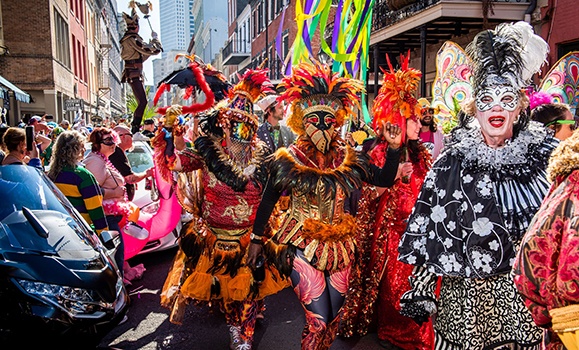When Dr. Martha Radice first traveled to New Orleans more than a decade ago to attend a major anthropology conference, she didn’t expect the impact the city would have on her research.
As a social anthropologist whose work focuses on the social, spatial, and cultural dynamics of cities, being introduced to the carnival culture in New Orleans inspired her to explore what the annual celebration does for the thousands of people who participate in the festivities.
“Carnival brings people a lot of joy, though it also takes a lot of hard work,” says Dr. Radice, an associate professor in the Department of Sociology and Social Anthropology. Her current research project, Grasping Joy: New-Wave Carnival Krewes in New Orleans explores the ‘new wave’ of carnival krewes and masking in New Orleans. It focuses on the walking krewes — a krewe being a social club that organizes carnival activities — that make their costumes, floats, and throws by hand, and that parade on foot rather than riding on floats.
Dr. Radice, along with photographer Ryan Hodgson-Rigsbee, have brought glimpses of that joy and the work behind it to the public through a collaborative exhibition that is now on display on the fence outside the New Orleans Jazz Museum. The show will remain there until just after Mardi Gras day, which falls on February 13 this year.
The work is funded by an Insight Grant from the Social Sciences and Humanities Research Council of Canada and a New Orleans Jazz and Heritage Foundation Archive Fellowship.
Carnival From the Ground Up is a tribute to the people who make New Orleans’s carnival by hand and who take it to the streets on foot. It features 70 photographs taken by Hodgson-Rigsbee over the last eight years as well as stories of the people represented. Dr. Radice, currently located in New Orleans on sabbatical leave, wrote the accompanying text, captions, and quotes.
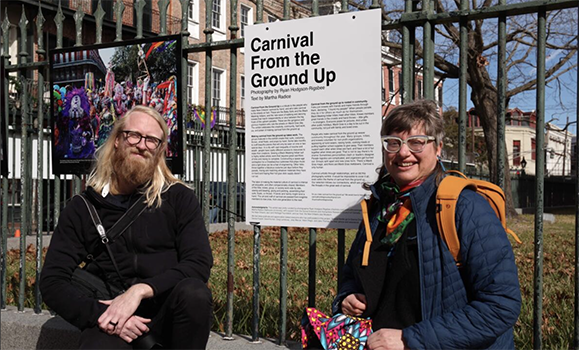
Ryan Hodgson-Rigsbee and Martha Radice pictured in New Orleans near their exhibition, Carnival From the Ground Up. (Photo © 2024 G. Mouton, III.)
Radice first met Hodgson-Rigsbee on a four-month research trip to New Orleans in 2016. She would see him taking photos almost everywhere she went. She realized that Hodgson-Rigsbee was undertaking a similar project to hers but with pictures instead of words, and that her research about carnival, something so visually dynamic, would be greatly enriched by working with a talented photographer already familiar with the culture and community. The two planned to create an outdoor photography exhibit as one of the knowledge mobilization events supported by Dr. Radice’s SSHRC Insight Grant.
See a selection of images and stories from the exhibition at the bottom of this article.
Creating — in a sociable way
The captions and quotes accompanying Hodgson-Rigsbee’s colourful photographs are drawn from Dr. Radice’s interviews with the people represented and explain what participating in carnival, especially the ‘do-it-yourself’ parts, means to people.
What she’s found is that creating carnival brings people joy, not only in the exuberance of the parades, but also in the satisfaction that people get out of the work behind the scenes as they make the things they need for carnival, often learning new skills or teaching others on the way.
“There is the pleasure to be had in creativity, in coming up with new ideas and playing with familiar themes,” she says, adding that people build a sense of community as they work or parade with the other members of their groups, and also as they perform for the crowds lining the streets.
“There is also the excitement, the magic that people feel when they are in the moment that they created, in their parade or when they come out in their suits or costumes on Mardi Gras day. For many people this is spiritual, as they uphold longstanding traditions or participate in deeply meaningful rituals.”
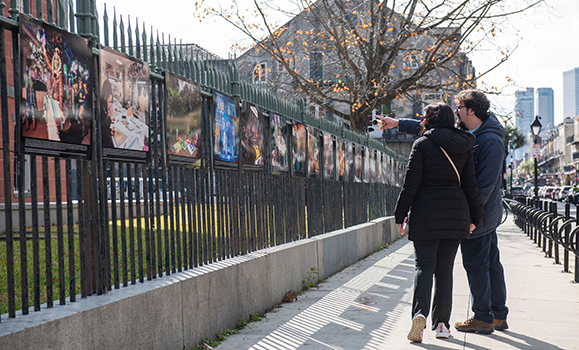
Passersby look at Carnival From the Ground Up on Decatur Street, New Orleans. The 70 photos are accessible to the public 24/7. (Photo © 2024 Ryan Hodgson-Rigsbee)
Dr. Radice’s research has given her first-hand experience of the joy of carnival. As an anthropologist, she uses the method of participant observation to learn about her research topic.
“I got to learn about carnival by showing up and helping,” she says.
“Being able to create things with other people in a sociable way, in a context that is outside of paid work is an important and rewarding kind of activity, and I think it is probably profoundly good for us as human beings. What's amazing is that carnival in New Orleans sets up a social structure for people to be able to do this, every year. And I think that's something that we can really learn from.”
Follow @carnivalfromthegroundup on Instagram for daily photos and read more about the exhibit Carnival From the Ground Up on Dr. Radice’s website.
See selections from the exhibition below. Photographs by Ryan Hodgson-Rigsbee; Words by Martha Radice.
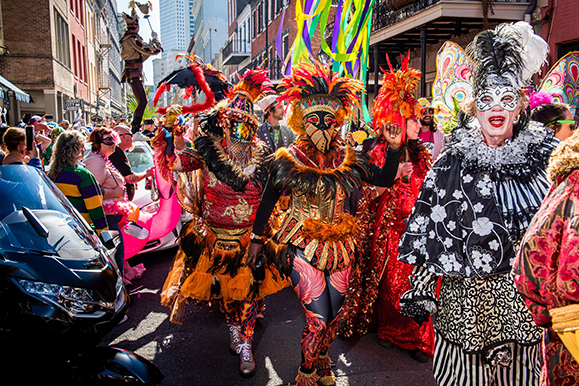
Photo © 2024 Ryan Hodgson-Rigsbee. Do not reproduce without permission.
Dressed as phoenixes for Mardi Gras 2022, the Society of Sainte Anne parades down Chartres Street towards Jackson Square on their way to the river. Sainte Anne was founded in 1969 by a group of friends keen to revive the gorgeous, glorious street masking traditions of Mardi Gras past. They remain, as one longtime member puts it, “a very anachronistic, anarchic group with no membership roster, no dues. We are an organic occurrence with a band — once a Secret Society and now the favorite to see on Mardi Gras morning — a group of friends and neighbors dressed in their finest regalia, going for a long walk together.”
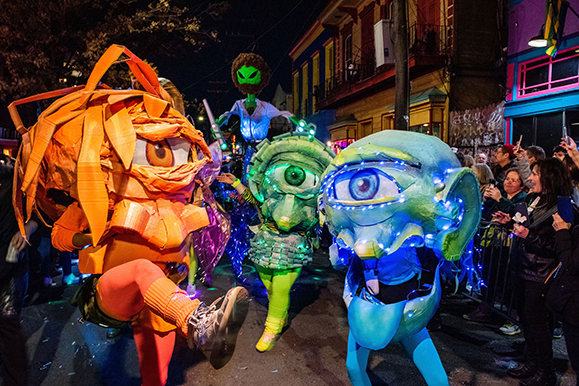
Photo © 2024 Ryan Hodgson-Rigsbee. Do not reproduce without permission.
Krewe de Lune parades in Krewe Bohème’s 2023 parade, on the theme “Night of the Living Art.” Founded in 2009, Krewe de Lune creates stellar puppets, costumes and contraptions to delight parade watchers, as well as hosting their annual Space Ball and Lunar Lagniappe fundraiser.
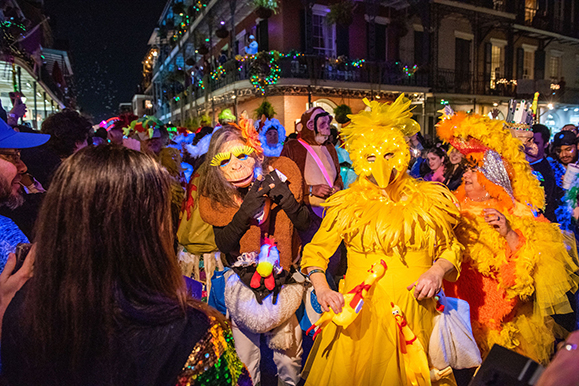
Photo © 2024 Ryan Hodgson-Rigsbee. Do not reproduce without permission.
Members of the Totally Orgasmic Krewe of Intergalactic Ne’er-do-wells, better known as T.O.K.I.N., parade in Krewe du Vieux in 2023.
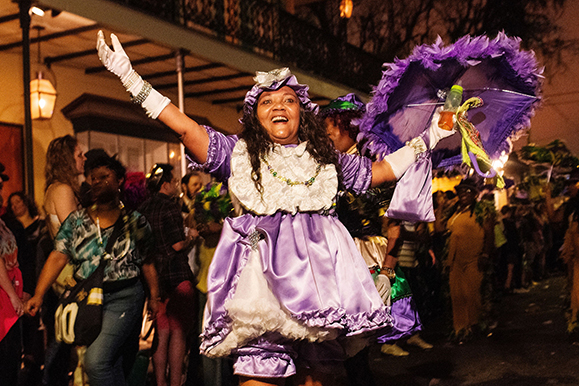
Photo © 2024 Ryan Hodgson-Rigsbee. Do not reproduce without permission.
“It’s healing the child within. Most women that I’ve encountered, most of the Baby Dolls, we’ve been through life’s struggles. It’s healing and it’s spiritual. When people in the audience see me and the other ladies dressed in doll style, no matter what a person may be going through, just to look at us and encounter us, even if it only lasts five minutes, it’s five minutes of spiritual healing. When we come out to play on Mardi Gras day, it doesn’t matter what challenges happened yesterday; when we dress in our regalia, it’s like learning to let go. All that matters is healing, bringing that happy, joyful spirit. It’s a spiritual release.”
Baby Doll Carol “Kit” Harris of the N’awlins D’awlins dances in the Krewe Delusion parade in 2019. The Baby Doll masking tradition dates back to the early 20th century. It waned in the middle of the century, but proud Black New Orleanian women started to bring Baby Dolls back from the 1970s on. The N’awlins D’awlins, which Baby Doll Kit founded in 2016, is one of the groups that keeps the culture thriving today.
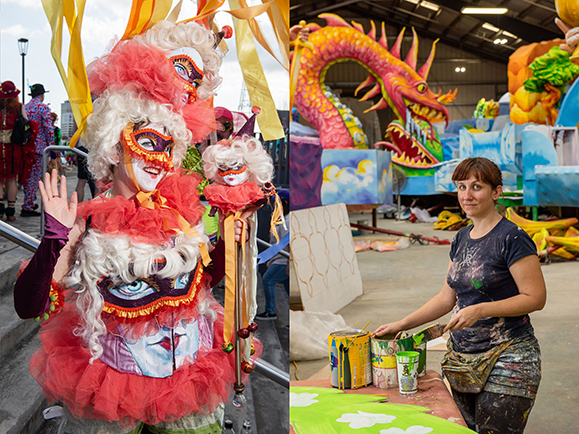
Photo © 2024 Ryan Hodgson-Rigsbee. Do not reproduce without permission.
“When I’m at work I’m always covered in filth, a behind-the-scenes art rat, versus the glam of Mardi Gras day, being polished with a pound of makeup on. The point of that look was to have a face on a face on a face on a face, to create a play on masking where you don’t know which is the real reality. Being at the river is the most sacred part of my Mardi Gras day. I always end up crying. There’s a baptismal quality to it. The river opens up space where you can process; it gives you that break in the day when you can center yourself. It’s a moment of intimacy. At work, you spend all year with the float two inches from your face, and you can’t see what it’s going to be until the parade finally rolls and it becomes one cohesive thing. The photo in the Rex den is like a coiled spring, and the photo by the river is me springing! With a float, the artists are hiding behind the surface. Costuming is one of the few creative experiences where I get to see people’s reactions in real time, but when I’m getting too much interaction, I can also hide behind the mask, trying to find that sweet spot.”
Caroline Thomas is Art Director at Royal Artists and lead painter of the Rex and Proteus carnival parades, pictured at work in the Rex den in 2022 and in costume at the Mississippi River on Mardi Gras day 2023.
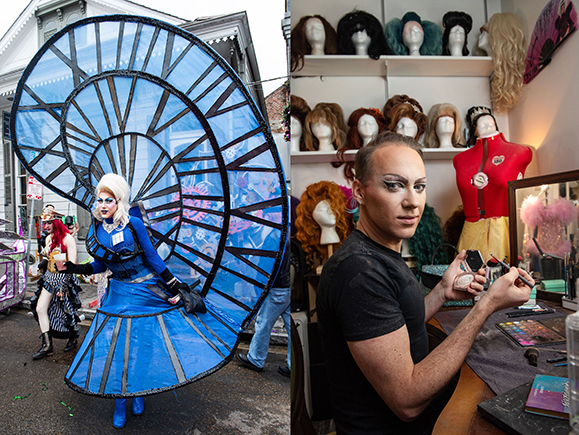
Photo © 2024 Ryan Hodgson-Rigsbee. Do not reproduce without permission.
“I’m in the Krewe of Armeinius, one of the oldest gay Mardi Gras krewes. Instead of a parade, we throw a ball. This blue costume was part of my tableau for the ball, but the tradition for the Krewe is to take our costumes out to the Bourbon Street Awards in the French Quarter on Mardi Gras day and show them off one more time, so it’s not six months to a year’s worth of work for just one night. The theme in 2020 was ‘The Time Ball.’ I have a three-foot TARDIS on my back, and the wavy blue and black piece has Roman numerals on it, so it’s the opening sequence of Doctor Who. And that costume won the Best Drag category. I won again in 2022! I started doing drag in 2018, and it has been going so well that I was able to leave the day job in public health, even though I loved the work, to do my art full time. Now the sweet spot for me is combining drag and public health!”
Debbie with a D (@debbiewithad) made this costume for her first performance in the Krewe of Armeinius bal masqué. Here, she is getting ready to host the Tuesday Open Talent night at Oz on Bourbon Street.

